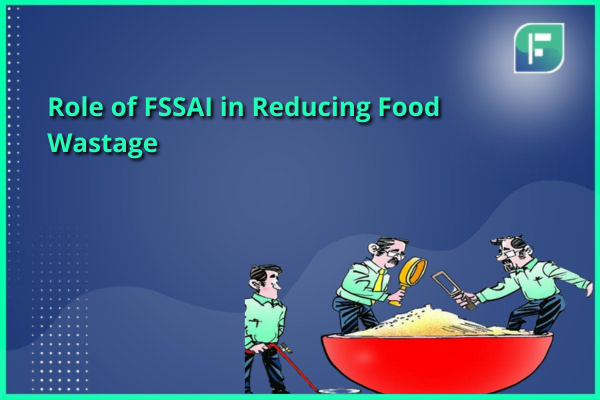The FSSAI licence is of paramount importance for businesses functioning in the Indian food industry. Regulated by the Food Safety and Standards Authority of India, this licence is an essential requirement for all food businesses and its fundamental aim is to guarantee the maintenance of food quality and safety standards throughout the industry. Reducing Food wastage within the supply chain presents a significant challenge in India. However, the role of FSSAI in reducing food wastage is vital in addressing this issue.
Understanding Food Wastage and its Consequences
Food waste denotes the disposal or abandonment of consumable food, frequently taking place at various points within the food distribution network. This wastage manifests during the stages of production, processing, distribution, and consumption.
The repercussions of food waste extend beyond the realm of food security, encompassing environmental, economic, and social domains. It exerts pressure on natural resources, adds to greenhouse gas emissions, and imposes economic burdens through heightened production expenses, along with detrimental effects on livelihoods. The role of FSSAI in reducing food wastage therefore becomes essential in current times.
The Role of FSSAI in Reducing Food Wastage and Ensuring Food Safety
FSSAI functions independently under the Ministry of Health & Family Welfare. Its primary mission is to establish scientifically grounded standards for food items and oversee their manufacturing, storage, and associated procedures. This mission is firmly based on the goal of ensuring the broad accessibility of safe and nourishing food for human consumption. Additionally, the role of FSSAI in reducing food wastage aligns with this objective.
Core Functions of FSSAI
1. Standard Establishment: FSSAI plays a pivotal role in setting food standards that are grounded in scientific principles, thereby upholding food safety and quality. These standards serve as benchmarks for the food industry, fostering uniform quality and safety standards throughout the sector.
2. Licencing and Registration: FSSAI mandates the licencing and registration of food-related businesses, effectively governing their operations. This regulation encourages accountability and compliance with food safety standards, furthering the cause of safe food production and distribution.
3. Monitoring and Surveillance: FSSAI diligently oversees and surveys the quality of food products available in the market, ensuring that they adhere to the specified standards. This vigilant monitoring serves as a safeguard for consumer health, mitigating potential risks associated with substandard or unsafe food items.
4. Consumer Education: FSSAI assumes the crucial role of educating and enlightening consumers about food safety and promoting healthy eating practices. By raising awareness, FSSAI empowers individuals to make informed choices regarding their food consumption, thereby contributing to improved food safety and reduced food waste.
FSSAI Regulations and Food Wastage Reduction
The role of FSSAI in reducing food wastage can be understood from FSSAI regulations on food waste reduction, which includes:
Transportation Regulations
FSSAI also sets forth regulations concerning food transportation to ensure that items are transported in a manner that preserves their freshness and quality. These regulations help prevent damage and spoilage during transit, contributing to reduced food wastage.
Implementing Good Manufacturing Practices
FSSAI mandates that food businesses adhere to Good Manufacturing Practices to ensure the hygienic processing of food with appropriate quality control measures. Implementing GMP minimises contamination risks, thereby reducing the production of unsafe food, which might otherwise go to waste due to safety concerns.
Quality Control and Standardisation
By enforcing GMP guidelines, FSSAI standardised the quality of food products, promoting uniformity within the food industry. This uniformity lowers the likelihood of product rejection or wastage due to inconsistent quality.
Facilitating Food Donation and Redistribution
FSSAI has established guidelines for the safe handling and donation of surplus food. These guidelines encourage food businesses to redistribute surplus but safe-to-consume food to charitable organisations, simultaneously reducing food wastage and assisting those in need.
Food Fortification and Donation Drives
FSSAI promotes food fortification to enhance the nutritional content of food products, reducing the wastage of nutrient-rich foods. Additionally, FSSAI supports various food donation drives, redirecting excess food to provide for the less fortunate and thereby curbing food wastage.
Regulating Expiry Dates and Labelling
FSSAI mandates the clear labelling of expiry dates on food products, ensuring that consumers are well-informed about the shelf life of the products they purchase. The role of FSSAI in reducing food wastage can be understood through such regulations which help prevent the consumption of expired food, consequently reducing wastage.
Nutritional Labelling
By enforcing nutritional labelling, FSSAI empowers consumers to make informed choices based on the nutritional value of food products. This can lead to more responsible purchasing habits, minimising unnecessary purchases and subsequent food wastage.
Final Thoughts
The role of FSSAI in reducing food wastage follows a comprehensive approach. Its regulations encompass a range of practices including proper storage and transportation, adherence to Good Manufacturing Practices, guidelines for safe food donation and redistribution, and regulation of expiry dates and nutritional labelling. These collective measures work synergistically to highlight the role of FSSAI in reducing food wastage across different stages of the food supply chain, from production to consumption.
By ensuring that food is handled, transported, and processed with a focus on quality and safety, FSSAI not only ensures consumer well-being but also advocates for responsible food production and consumption practices. FSSAI’s endeavours align with broader objectives such as achieving food security, reducing environmental footprints, and addressing the social and economic challenges associated with food wastage in India.






